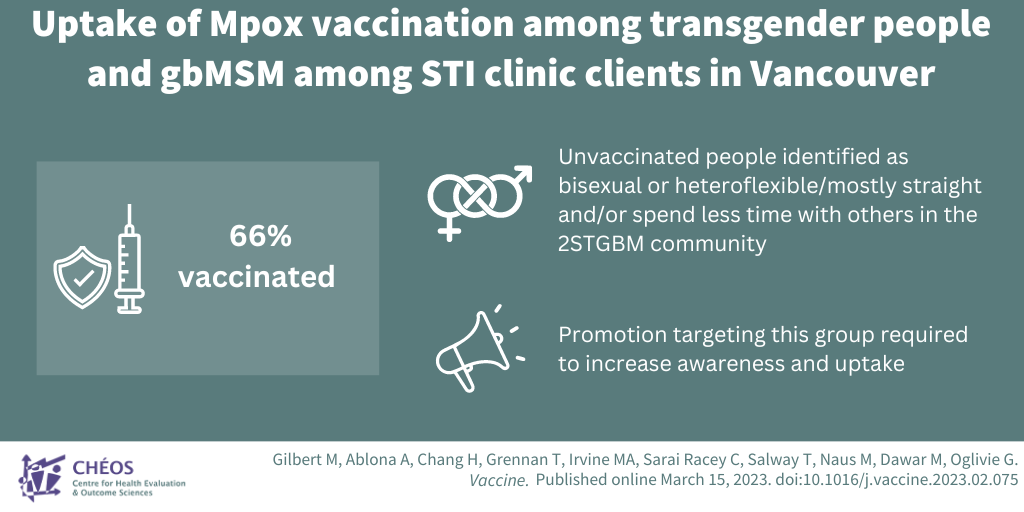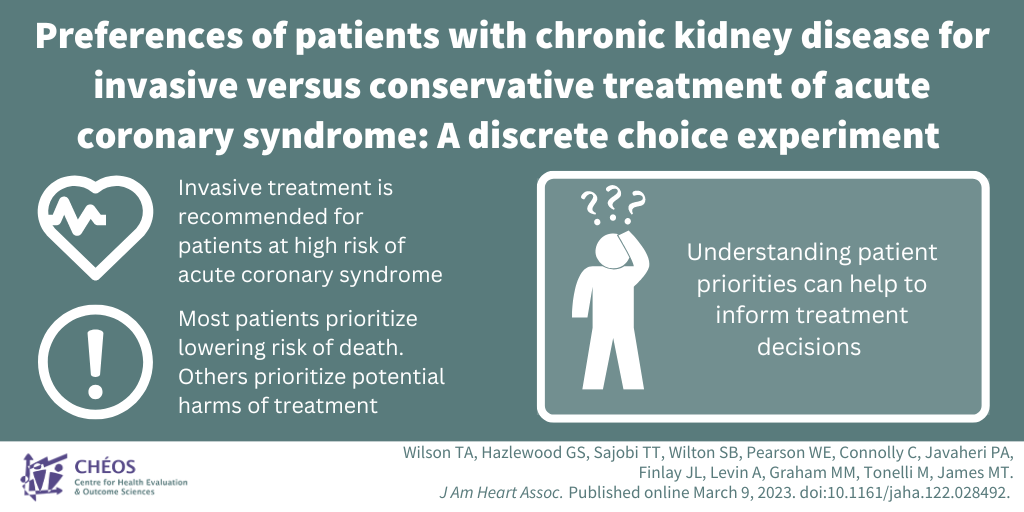The Evidence Speaks Series is a recurring feature highlighting the latest in CHÉOS research. This series features summaries of select publications and is designed to keep media and the research community up to date with CHÉOS’ current research results in the health outcomes field.
To ensure this research is quick and easy to share, we are now providing social cards that you are free to save and use as you see fit.
Vaccine promotion could improve uptake of the Mpox vaccine among transgender people and men who have sex with men
Gilbert M, Ablona A, Chang H, Grennan T, Irvine MA, Sarai Racey C, Salway T, Naus M, Dawar M, Ogilvie G. Uptake of Mpox vaccination among transgender people and gay, bisexual and other men who have sex with men among sexually-transmitted infection clinic clients in Vancouver, British Columbia. Vaccine. Published online March 7, 2023.
Since the outbreak in 2022, the majority of Mpox cases have been among Two-Spirit, transgender, gay, bisexual, and other men who have sex with men (2STGBM). Dr. Troy Grennan and his team worked to identify Mpox vaccine uptake in this group to understand if further vaccine promotion and delivery may be needed. The team conducted an online survey of 331 clients who had attended an STI clinic 5–7 weeks after the first Mpox vaccination campaign in B.C. The results showed that 66 per cent of vaccine-eligible 2STGBM participants had been vaccinated; those who were unvaccinated were more likely to identify as bisexual or heteroflexible/mostly straight. Spending less time with others from the 2STGBM community was also associated with being unvaccinated. Participants who were eligible but unvaccinated were less likely to have been recommended the vaccine by a peer, were less likely to have seen information promoting the vaccine, had lower perceived susceptibility to Mpox, or experienced barriers related to accessing clinics and privacy. Among those who were unvaccinated, 85.3 per cent indicated that they would be happy to receive the vaccine, indicating that vaccine promotion could be improved to target these groups and improve access.

—
Children of immigrant origin may benefit from more inclusive, culturally sensitive organized after-school activities
Albanese CM, Oberle E, Sutherland JM, Janus M, Schonert-Reichl KA, Georgiades K, Guhn M, Gagné Petteni M, Gadermann A. A cross-sectional study of organized activity participation and emotional wellbeing among non-immigrant and immigrant-origin children in British Columbia, Canada. Prev Med Rep. 2022 Nov 14;31:102052.
CHÉOS Program Head – Health Services and Outcomes Dr. Jason Sutherland, Scientist Dr. Anne Gadermann, and Research Associate Monique Gagné Petteni looked at organized activity participation among a sample of 14,406 Grade 7 children in B.C. to measure the association with their emotional wellbeing. They also examined whether this relationship depended on immigration background (34.8 per cent of children were of immigrant origin, 40.8 per cent of whom were first-generation immigrants). The children completed a survey on their after-school activities, life and friendship satisfaction, and demographics, including their immigration status and family MSP subsidy history. The researchers found that participation in after-school organized activity did not differ between immigrant and non-immigrant children. However, participation in organized activities did correlate with improved life satisfaction and a reduction in depressive symptoms among non-immigrant children only; children of first-generation immigrants did not see the same benefits. These results suggest that efforts should be made to ensure an inclusive and positive experience in after-school programming for immigrant children to support their emotional wellbeing.

—
Understanding patient priorities can help inform disease management decisions
Wilson TA, Hazlewood GS, Sajobi TT, Wilton SB, Pearson WE, Conolly C, Javaheri PA, Finlay JL, Levin A, Graham MM, Tonelli M, James MT. Preferences of patients with chronic kidney disease for invasive versus conservative treatment of acute coronary syndrome: A discrete choice experiment. J Am Heart Assoc. Published online March 9, 2023.
Patients with chronic kidney disease (CKD) can also experience coronary artery disease and have an elevated risk of mortality and cardiovascular events, such as heart disease, following an acute coronary syndrome (ACS). Early invasive management of ACS is usually recommended for high-risk patients. However, choosing between an early invasive versus conservative management approach requires patients to make decisions balancing the risk of future cardiovascular events and death against the risk of kidney injury and kidney failure, which may require dialysis in future. CHÉOS’ Dr. Adeera Levin and team looked at the ACS management preferences of patients with CKD from two clinics in Alberta. Most study participants said that lowering risk of death was the most important factor in their decision-making, aligning with the benefit of invasive management. However, there was a subgroup of patients (almost 20 per cent) who were more influenced by the potential harms of invasive management and had a stronger preference for avoiding acute kidney injury. The study highlights the importance of understanding patient preferences and priorities when discussing treatment options to ensure decisions are aligned with patient values.




